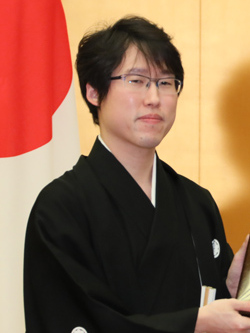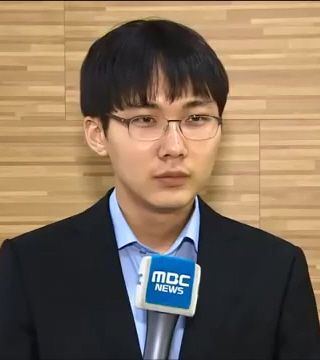Jūbango (十番碁) is a Japanese term for a Go match consisting of ten games which might be ended earlier if agreed by both players. A decisive victory would result in the opponent being 'beaten down' to a lower rank. A player would be beaten down if he fell behind his opponent by four wins in the net score. This would mean a change in the playing terms corresponding to a handicap suitable for a rank difference of one rank. Some notable historical jūbango players are Go Seigen (1914-2014), Kitani Minoru (1909–75), Honinbo Shuei (1852-1907) and Hashimoto Utaro (1907-94).
These matches were usually spread over long time-periods, with gaps of months possible between games. They were also peripatetic (taking place in different venues). Both of these features make them different from modern mind sports matches, which tend to be held over a short time in a definite location. Modern go title matches have adapted these characteristics of a jūbango.
Among other formal matches, the jūbango was a traditional form of contest in the Edo period, where players would undertake such a match against a close rival, with the goal of determining which player was stronger. In that era, top rankings were hard to achieve. The normal starting conditions would be those corresponding to the players being of equal rank, or tagaisen . This means they should alternate with Black and White, this being before the era of komigo . Not all matches were played on tagaisen terms.
If agreed, there was the possibility of playing at a handicap, e.g. Black two games out of three, if one player went far enough ahead. This could be reinforced to one player always taking Black, a handicap equivalent to two professional ranks, in extreme cases. For details see professional go handicaps. An uchikomi jūbango was one in which 'beating down' applied.
These conventions were revived and made more precise by a series of high-profile matches in the twentieth century, sponsored by the Yomiuri Shimbun . Between about 1930 and 1960, jūbango included many of the most important games, judged by prestige, in Japanese professional go. After 1960 the annual title matches sponsored by newspapers took over, in the public interest.
The era of jūbango was dominated by Go Seigen, who had an outstanding record in these games against his peers.
After a break of 10 years, a jūbango was held in 2014 from 26 January - 28 September between Gu Li and Lee Sedol, two of the world's leading players. The format of the match was first to 6 wins. The match lasted for eight games and was won by Lee Sedol with 6 wins, 2 losses and no draws. The prize money was ¥5,000,000 (~800,000 USD). Games 1-3 and 5-8 were held in different cities in China. Game 4 was held in Shinan, South Korea. [1]

Go is an abstract strategy board game for two players in which the aim is to fence off more territory than the opponent. The game was invented in China more than 2,500 years ago and is believed to be the oldest board game continuously played to the present day. A 2016 survey by the International Go Federation's 75 member nations found that there are over 46 million people worldwide who know how to play Go, and over 20 million current players, the majority of whom live in East Asia.

Wu Chuan, courtesy name Wu Ching-yuan, better known by the Japanese pronunciation of his courtesy name, Go Seigen, was a Han Chinese master of the game of Go. He is considered by many players to have been the greatest Go player in the 20th century.
Hon'inbō Shūsai is the professional name of Hoju Tamura, also known as Yasuhisa Tamura, who was a Japanese professional Go player.

Lee Sedol, or Lee Se-dol, is a former South Korean professional Go player of 9 dan rank. As of February 2016, he ranked second in international titles (18), behind only Lee Chang-ho (21). His nickname is "The Strong Stone" ("Ssen-dol"). In March 2016, he played a notable series of matches against the program AlphaGo that ended in Lee losing 1–4.

Chen Yaoye is a Chinese professional Go player.

Yuta Iyama Kisei, Honinbo, Meijin is a Japanese professional Go player. In April 2016, he became the first player in Japanese history to hold all seven major titles simultaneously. In January 2018, Iyama became the first professional Go player to be awarded Japan's People's Honour Award.

Hosai Fujisawa was a professional Go player. Hideyuki Fujisawa is his uncle.
Hon'inbō Shūei was a Japanese professional Go player.
Gu Li is a Chinese professional Go player.
Kong Jie is a Chinese professional Go player.
Kang Dongyun is a professional Go player.

Professional Go handicaps were a system developed in Japan, in the Edo period, for handicapping professional players of the game of Go against each other. With the abolition of the Oteai system, which from the 1920s had used some handicap games to determine the Go ranking of professional players, this system has become obsolete. It is now completely superseded by the use of komidashi. Knowledge of it is required to understand the conditions of play in historical Go matches, particularly the jubango that died out around 1960.
The Kamakurajubango was a historically significant go match played in Japan in 1939, 1940 and 1941. It pitted Kitani Minoru and Go Seigen, close rivals for a decade and friends at a personal level, and both ranked 7 dan, against each other.
The 1st Bosai Cup was the first edition of the Bosai Cup.

Park Junghwan is a South Korean professional Go player of 9-dan rank.
AlphaGo is a computer program that plays the board game Go. It was developed by the London-based DeepMind Technologies, an acquired subsidiary of Google. Subsequent versions of AlphaGo became increasingly powerful, including a version that competed under the name Master. After retiring from competitive play, AlphaGo Master was succeeded by an even more powerful version known as AlphaGo Zero, which was completely self-taught without learning from human games. AlphaGo Zero was then generalized into a program known as AlphaZero, which played additional games, including chess and shogi. AlphaZero has in turn been succeeded by a program known as MuZero which learns without being taught the rules.
AlphaGo versus Lee Sedol, also known as the DeepMind Challenge Match, was a five-game Go match between top Go player Lee Sedol and AlphaGo, a computer Go program developed by DeepMind, played in Seoul, South Korea between 9 and 15 March 2016. AlphaGo won all but the fourth game; all games were won by resignation. The match has been compared with the historic chess match between Deep Blue and Garry Kasparov in 1997.

Ke Jie is a Chinese professional Go player of 9 dan rank. He was born on August 2, 1997, in Liandu District, Lishui City, Zhejiang Province.
Zen, sold as Tencho no Igo in Japan, is a closed source Go playing engine developed by Yoji Ojima (尾島陽児), a Japanese Go programmer.